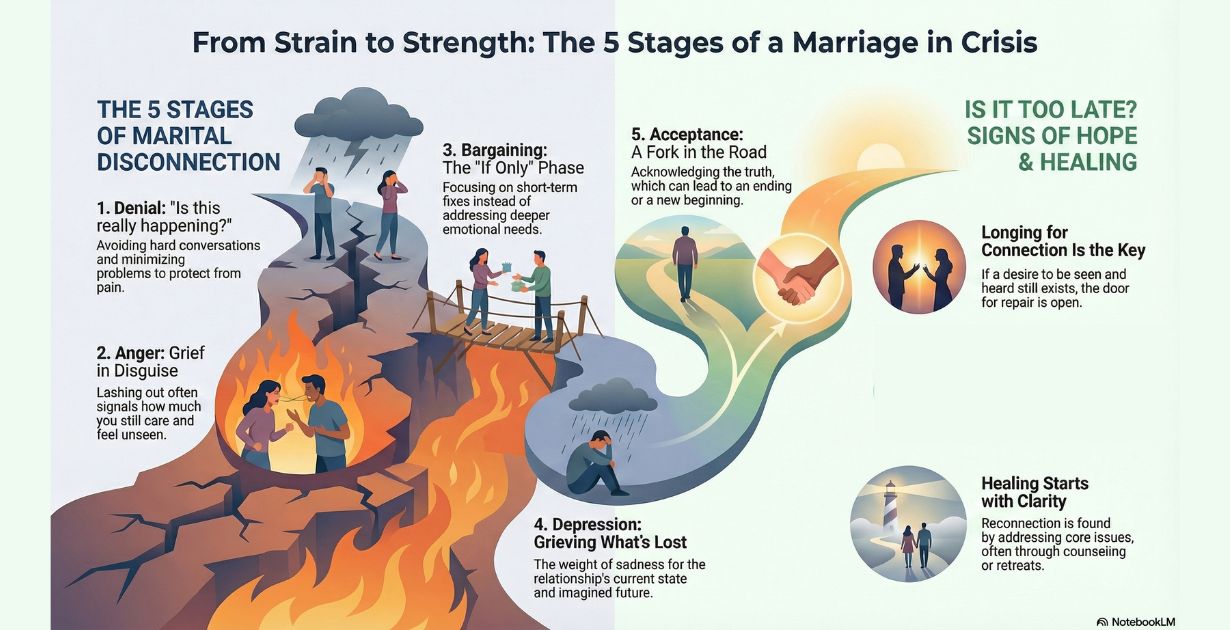- couples therapy retreats
- RETREAT THEMES
- TRAVEL CONCIERGE
- THE LOVERS SOCIETY
- Blog
- Press


If you’ve found yourself Googling “What are the 5 stages of divorce?” you’re not alone. Many couples search for answers not because they want to leave, but because they’re scared they might already be on that path. Understanding these stages can give language to the chaos you’re feeling—and more importantly, help you see whether the door to healing is still open.
Denial is the mind’s way of protecting us from pain. You might notice yourself minimizing problems or convincing yourself that things will “just get better with time.”
In relationships, denial often looks like avoiding hard conversations. It can feel safer to stay silent than to risk rupture. But beneath that silence is often longing—wanting desperately to be seen, understood, and reconnected with your partner.
When the reality of the relationship’s strain sets in, anger often follows. This isn’t just about frustration—it’s often grief in disguise. Couples may lash out because feeling vulnerable or unseen is too painful.
In this stage, partners may question: Can intimacy survive when we’re constantly clashing? The truth is, anger signals how much you still care. Underneath every sharp word is often the question: Do I still matter to you?
Research supports this. The American Psychological Association (2020) notes that conflict itself isn’t what ends most marriages—it’s the erosion of positive connection and unresolved emotional injuries that make repair difficult.
Bargaining can sound like: “If only we stopped fighting, things would be better.” Or, “If I try harder, maybe this will work.”
The problem is that bargaining often skips over the deeper needs. Instead of addressing old wounds or unmet desires, it focuses on short-term fixes. Couples in this stage may start looking for outside answers—workshops, books, or even retreats—as a way of finding clarity.
Depression is often the hardest stage of divorce. The weight of sadness, isolation, and loss can feel overwhelming. And it often begins before the relationship has legally or formally ended. You may grieve not only what’s happening now, but also the imagined future you thought you’d share.
Studies confirm the deep impact of divorce on mental health. Research published in the Journal of Health and Social Behavior (Amato, 2010) found that adults who go through divorce report higher rates of psychological distress, particularly during the early years of separation.
This stage can be particularly hard on children, who may sense the heaviness and develop their own coping strategies. A meta-analysis in Psychological Bulletin (Amato & Keith, 1991) showed that children of divorce experience higher risks of adjustment difficulties, though supportive co-parenting can mitigate these effects.
Acceptance doesn’t always mean the marriage is over. For some, it means recognizing the relationship as it is, and choosing to end it. For others, acceptance can be the turning point where both partners acknowledge the truth of their disconnection—and decide to work toward reconnection.
This is where the story can shift. Acceptance can mark an ending, but it can also mark a new beginning.
Here are some signs that the door to repair may still be open:
Research from The Gottman Institute shows that marriages don’t end because of conflict alone—they end when partners feel unseen, unheard, and uncared for. In fact, Gottman’s research predicts divorce with over 90% accuracy based on patterns of disconnection—not arguments themselves. Which means, if the longing for connection is still there, there’s still room for healing.
Some couples turn to counseling, others to structured workshops. For those in acute crisis, private couples therapy retreats offer an intensive space to address the core of disconnection quickly. These retreats don’t just focus on saving a marriage—they focus on clarity. Sometimes couples recommit with new tools and understanding. Other times, they part ways with compassion and care, instead of conflict.
The stages of divorce mirror grief because divorce is, at its core, a loss—of expectations, identity, and future dreams. But acceptance doesn’t always mean giving up on your marriage. It can mean embracing the truth of where you are, and choosing to write a new chapter—together or apart.
Emotional Safety & Communication
stages of divorce grief, divorce and marriage counseling, divorce acceptance stage, is it too late to save my marriage, divorce and longing
Back to Blog
